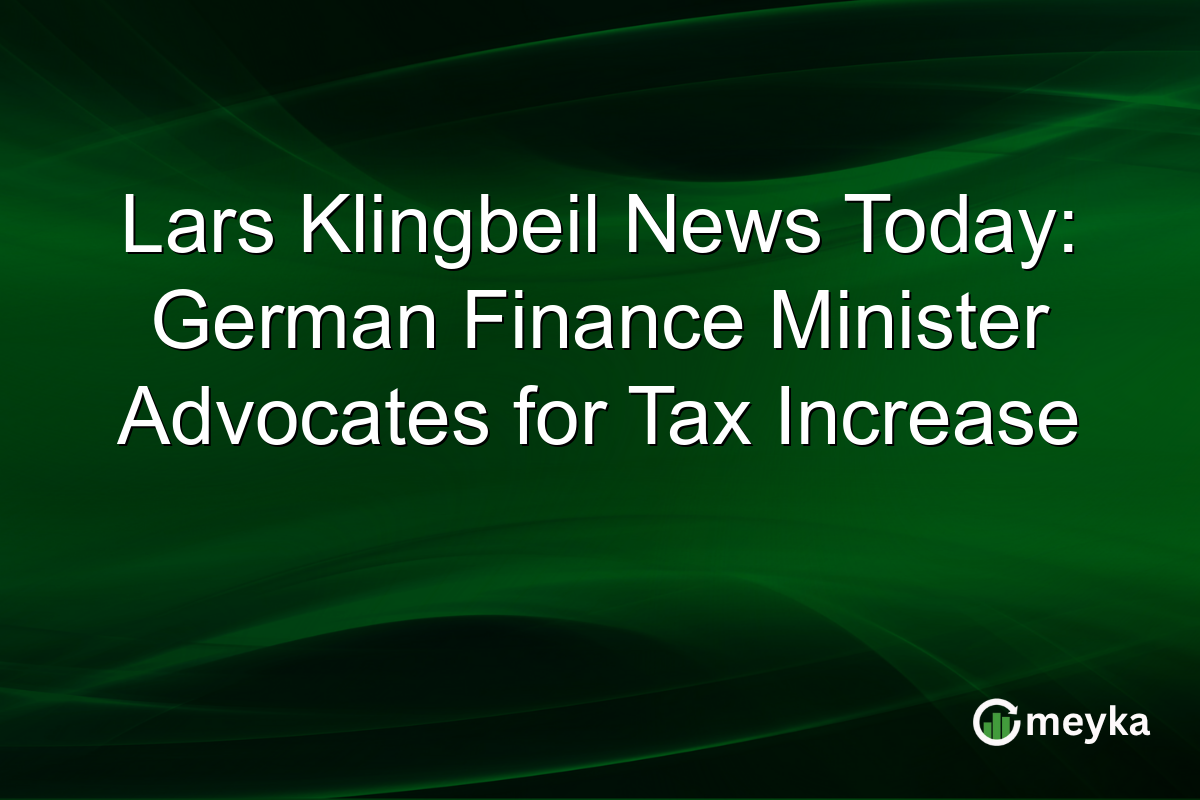Lars Klingbeil News Today: German Finance Minister Advocates for Tax Increase
Today, German Finance Minister Lars Klingbeil announced the potential for tax increases to manage an anticipated budget shortfall of €30 billion by 2027. This call for higher taxes, particularly targeting wealthier citizens, marks a significant shift in Germany’s fiscal strategy. Drawing attention to the challenges posed by rising public spending and economic demands, Klingbeil’s proposal aims to secure Germany’s financial health.
Lars Klingbeil’s Fiscal Challenge
Germany is facing substantial economic hurdles with a projected €30 billion budget deficit by 2027. To address this gap, Finance Minister Lars Klingbeil has suggested enacting tax hikes. These adjustments primarily target higher-income earners to provide the necessary funds. This approach comes as Germany grapples with increased costs in public spending, including healthcare and infrastructure. The proposed tax policy changes demonstrate a focus on equity by asking more from those who can afford it. This strategic move could stabilize Germany’s fiscal landscape while maintaining key social services.
Impact on German Economic Policy
The suggestion for a tax increase by Klingbeil signals a possible shift in German economic policy. Historically, Germany has favored austerity measures; however, this pivot towards higher taxation aligns with efforts to reduce inequality and enhance social welfare. By advocating for a tax policy change, Germany emphasizes fiscal responsibility and social equity. Economic experts suggest this could lead to a more sustainable balance between revenue and expenditure. However, some critics argue it may disincentivize investment and economic growth in the long term.
Public and Political Reaction
Lars Klingbeil’s proposal has sparked an array of reactions across the political spectrum. Supporters argue that increased taxation on the wealthy can address income disparity and sustain social programs. Conversely, opponents fear that it might affect Germany’s economic competitiveness. Public sentiment seems divided. Those supportive of greater equity welcome the change, whereas others express concern about potential impacts on job creation and investment. This issue is expected to dominate Germany’s political debates as policymakers weigh short-term benefits against long-term economic impacts. Here’s a related discussion on X: German Finance Minister on Tax Increase
Looking Ahead: What Should Investors Know?
For investors, Klingbeil’s proposed tax policy changes present both risks and opportunities. A well-managed transition could strengthen Germany’s economic stability, potentially enhancing investor confidence in the long term. However, increased taxation might raise concerns about reduced disposable income and purchasing power affecting consumer-driven sectors. Investors should monitor legislative developments closely, as shifts in Germany’s tax policy can influence European markets. Meyka, an AI-powered financial platform, provides real-time insights into these dynamic changes, assisting investors in navigating potential market adjustments.
Final Thoughts
In conclusion, Lars Klingbeil’s advocacy for higher taxes on the wealthy to close Germany’s budget deficit extends beyond fiscal necessity—it reflects a potential shift towards a more inclusive economic policy. While this approach may stabilize Germany’s financial standing, it raises critical discussions about economic growth and equity. Investors should stay informed about these changes, as they may impact various market sectors. The delicate balance between fiscal responsibility and economic vitality remains at the forefront. With Germany’s economic landscape poised for change, resources like Meyka can offer real-time insights and predictions, empowering investors to make informed decisions amidst evolving policies.
FAQs
Lars Klingbeil has proposed tax increases to address a projected €30 billion budget deficit by 2027. The plan focuses on increasing taxes on wealthier citizens to ensure adequate public funding and economic stability.
The tax changes could increase public revenue, stabilizing the fiscal framework. However, there is a concern it could disincentivize investment and slow economic growth if not properly managed.
Politically, the proposal is divisive. Some praise it for addressing equity and budget concerns, while others fear it could affect Germany’s competitiveness and economic growth.
Disclaimer:
This is for information only, not financial advice. Always do your research.






